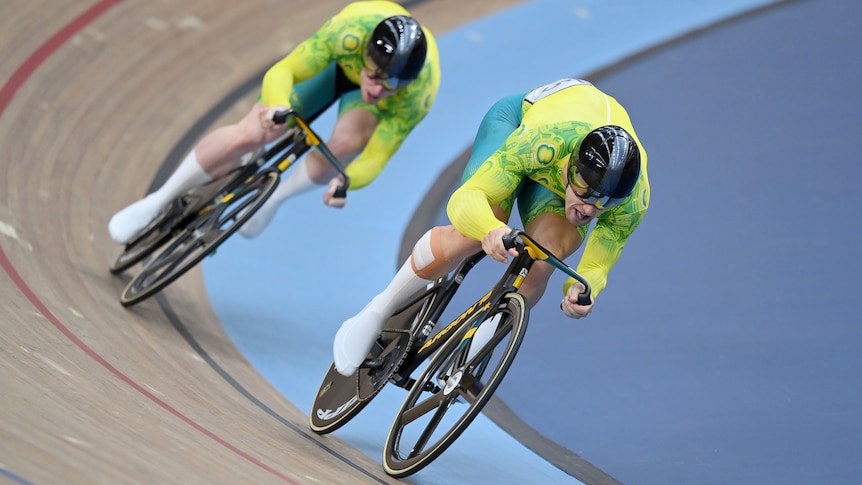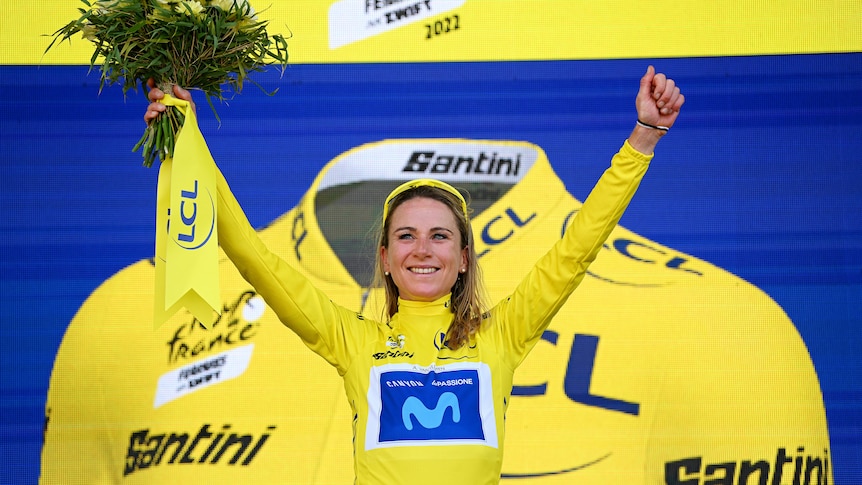Australian cycling’s governing body AusCycling has been forced to remove handlebars from its track bikes being used in the 1,000m time trial at the Birmingham 2022 Commonwealth Games due to them being unsafe for use.
Key points:
- AusCycling released a statement at the same time that competition started at the Commonwealth Games
- Matt Glaetzer won gold, Thomas Cornish silver and Matthew Richardson came fourth despite riding a theoretically slower set up
- AusCycling came under fire at the Tokyo Olympics when a handlebar set failed during a race
That didn’t stop Australia’s trio of riders though as Matt Glaetzer roared to a stunning gold medal, beating fellow Aussie Tom Cornish by over half a second into silver.
It was Glaezer’s fifth Commonwealth Games gold.
Matt Richardson came fourth behind bronze medalist Nicholas Paul of Trinidad and Tobago.
The performance of the Aussies was all the more remarkable given the fact that all three were riding a set up that was theoretically slower than their competitors.
In a statement released just hours before the event was due to start, AusCycling said the pursuit bars used in Monday’s 1,000m time trial “cannot be used safely” and that drop bars would be used instead.
The statement read that the drop bars would be “marginally slower” but would “tolerate the loads generated during competition”.
“We acknowledge that this decision has created a degree of disappointment,” Jesse Korf, AusCycling’s performance manager said.
“But the riders and the broader team understand that safety is our top priority.”
Drop bars are the same configuration that the riders use in the power-based sprint events and are positioned at either side and slightly below the handlebars.
Riders are not in as aerodynamic a position as they would be if they were using pursuit bars.
Pursuit bars are positioned centrally and allow a rider to sit with their arms out in front of them, as is the case in the endurance events on the track.
AusCycling came under fire at the delayed 2020 Olympics in Tokyo when Alex Porter’s handlebars spectacularly failed in qualifying for the team pursuit.
Porter was riding at 65 kilometers per hour when his handlebar suffered a catastrophic failure, he then suffered painful facial injuries after crashing face-first into the track.
An AusCycling report issued after the Tokyo Games found inadequate governance was in part to blame for the failure, with the custom-made pursuit handlebars not adequately tested prior to their use.
Porter went on to win a bronze medal in the event alongside Kelland O’Brien, Sam Welsford and Leigh Howard after the team were given a second chance to qualify.
“We have made significant changes to procedures, team structure and process since the Tokyo Olympics and this decision is reflective of a new and thorough approach to long-term engineering excellence, competitive success, and athlete welfare,” Korf said.
Questions will be asked of the timing of the announcement, which was made at the same time that the day’s session began in at the Lee Valley VeloPark in London.
AusCycling said the timing of the decision was a result of having to thoroughly test the equipment and investigate possible alternatives.
The track cycling events at the Lee Valley velodrome have already been marred by a series of dramatic crashes.
England’s Matt Walls was thrown into the crowd after a horrific crash in qualifying for the men’s scratch race.
The day prior, Glaetzer was able to walk away from a similarly brutal collision in the Keirin that left his English opponent Joe Truman sliding face-down along the track, unconscious.
The 1,000 meter time trial is a non-Olympic event, but will be competed at the World Championships in France later in the year.
AusCycling said that it would work with Argon 18, who make the equipment, in order to ensure there would be no issues.
.

